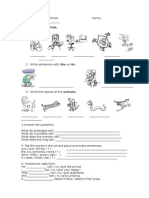0% found this document useful (0 votes)
25 views20 pagesPractical File
The document provides implementations of various data structures in C++, including Singly Linked List, Doubly Linked List, Circular Linked List, Stack, Queue, Binary Search Tree (BST), and AVL Tree. Each data structure is defined with methods for insertion, deletion, searching, and displaying elements. The document includes example usage for each data structure in a main function.
Uploaded by
4n9ypsxqmmCopyright
© © All Rights Reserved
We take content rights seriously. If you suspect this is your content, claim it here.
Available Formats
Download as PDF, TXT or read online on Scribd
0% found this document useful (0 votes)
25 views20 pagesPractical File
The document provides implementations of various data structures in C++, including Singly Linked List, Doubly Linked List, Circular Linked List, Stack, Queue, Binary Search Tree (BST), and AVL Tree. Each data structure is defined with methods for insertion, deletion, searching, and displaying elements. The document includes example usage for each data structure in a main function.
Uploaded by
4n9ypsxqmmCopyright
© © All Rights Reserved
We take content rights seriously. If you suspect this is your content, claim it here.
Available Formats
Download as PDF, TXT or read online on Scribd
/ 20






















































































